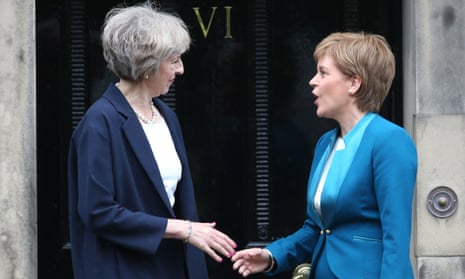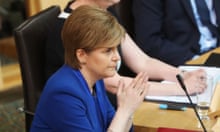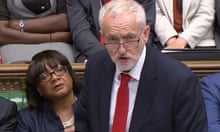Theresa May faces a fresh constitutional battle with the Scottish government after conceding that the Holyrood parliament could be allowed to vote on her Brexit plans.
Speaking as she debated the Queen’s speech at Westminster, the prime minister said her government was considering whether to offer Holyrood the right to vote on the repeal bill that will enact the UK’s departure from the EU.
Scotland’s Brexit minister, Mike Russell, warned May that his government would ask the Scottish parliament to vote against that so-called legislative consent motion unless it was happy with its main measures.
That threatens to open up a series of conflicts between Westminster and Holyrood over which powers and policies now controlled in Brussels would be handed to Holyrood, and to the devolved parliaments in Cardiff and Stormont, and which would be kept in Whitehall.
Russell has repeatedly accused May’s government of planning a “power grab” by plotting to keep hold of many substantial powers in areas such as fisheries, farming, industrial policy and consumer protection, which are largely devolved.
He said it was clear that several bills outlined in the Queen’s speech, particularly the repeal bill, would require legislative consent motions. He added it would be completely unacceptable for May to introduce powers that affected Scotland without giving Holyrood the right to debate and vote on those.
The Scotland Act 1998, which introduced devolution, says the UK parliament cannot “normally” legislate on Scottish affairs without a legislative consent motion from Holyrood, under a protocol known as the Sewel convention after the then Labour minister who drafted it. It adds, however, that that can be set aside by Westminster.
That raises the clear risk for the Conservative government that Holyrood could withhold its consent at a critical time during the Brexit process, plunging both governments into a political crisis over the Scottish parliament’s powers.
That could force ministers in London to ignore the Holyrood vote or lead ministers in Edinburgh to go to the supreme court for a ruling on whether Holyrood can prevent those parts of the bill that affect Scotland from coming into law.
Russell’s suspicions were heightened after the UK government’s background paper on the Queen’s speech said the repeal bill would centralise all EU-level powers that are not yet devolved in Whitehall immediately after Brexit.
The paper said that would be a temporary, transitional arrangement “to provide certainty after exit and allow intensive discussion and consultation with the devolved administrations on where lasting common frameworks are needed”.
That implies that a final deal on which new fisheries, farming, industrial or employment powers would be devolved could be delayed for several years – extending the Brexit process for Scotland, Wales and Northern Ireland into the 2020s. The UK government has given little indication as to which new powers will be devolved, despite promising that extra powers will follow Brexit.
Russell said: “The Scottish government has been consistently clear that repatriated EU competences must return to the Scottish parliament in areas where it is wholly or partly responsible, such as agriculture, fisheries, environmental policy and justice.
“There can be absolutely no question of the UK government attempting to reserve powers in devolved areas and the Scottish government would not recommend the Scottish parliament consents to such proposals. Where it is sensible or desirable to introduce a common UK framework to replace that provided by EU law, this must be achieved through agreement and negotiation.”
Graham Matthews, president of the Law Society of Scotland, said the UK government had to quickly set out how it planned to implement its legal powers to change Scottish and UK legislation. It had “Henry VIII powers” to change laws without a vote using subordinate legislation.
“As the UK government moves forward in its negotiations on how we leave the EU, it will be essential to involve each of the devolved administrations,” Matthews said.
“We have particular concerns as the Scotland Act 1998 embeds EU law into the fabric of Scottish devolution and we think that each order should be consulted on and should also be accompanied by a financial memorandum and economic impact assessment.”
With Nicola Sturgeon, Scotland’s first minister, struggling to build popular support for a fresh independence referendum, repeated conflicts between the two governments over Scotland’s right to decide on this could fuel calls for one. Sturgeon is due to set out next week whether she will continue to press for that referendum, after the issue in part led to the Scottish National party losing 21 seats in the general election.
With Sturgeon then threatening a new referendum, David Mundell, the Scottish secretary, said earlier this year that he believed a legislative consent motion would be needed, given the scale of the legal and policy changes required by Brexit.
Downing Street officials indicated that the prime minister hoped legislative consent would be a formality because, by then, the terms of the Brexit deal and its implications would be agreed.
“She said we’re considering that; I think the point is we would hope that everyone will get behind delivering on the will of the British people,” her spokesman said, adding, “these are complicated legal matters. As the PM said, we’re looking at it right now.”









